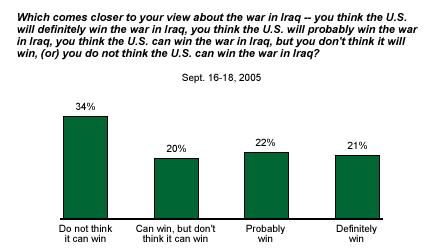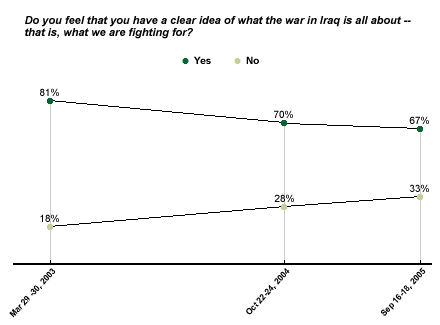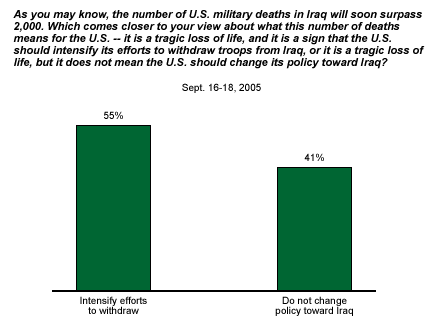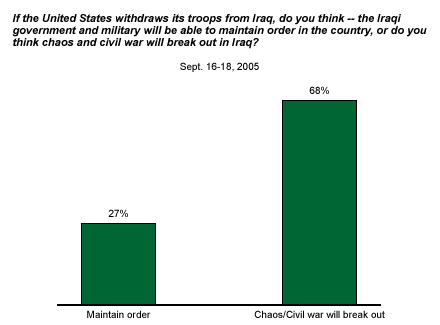The daily news from Iraq is rarely good. Bombing and body count reports eclipse even the brief shining moments, such as Iraqis' opportunity to vote on their new constitution last weekend. The bad news blitz may be collectively wearing on Americans. A recent CNN/USA Today/Gallup poll shows Americans are divided on whether the United States can win the war and are increasingly confused about what the United States is fighting for. They see mounting U.S. fatalities as a sign that the United States should leave Iraq, but they also think Iraq will descend into chaos if troops leave.
Can the United States Win?
The September poll found most Americans have doubts about whether the United States will win the war in Iraq. Fifty-four percent do not believe the United States will win, while 43% think it will. However, most Americans believe the United States can win -- 63% do, while 34% do not.

Iraq War's Purpose
The poll also asked respondents if they had a clear idea of what the war is all about -- what the United States is fighting for. Two-thirds say they do, while a third say they do not. The percentage who believe they understand the war's purpose has declined since March 2003, shortly after the war began. At that time, 8 in 10 said they felt they knew what the nation was fighting for. That percentage dropped to 70% in the fall of 2004.

Gallup has asked this same question during other military conflicts. Typically, a majority of Americans say they know what the war in question is about. The most recent reading on Iraq is among the lowest Gallup has found historically. Two other measures were lower -- in May 1967, just 49% of Americans said they understood what the Vietnam War was about, and in 1944, 59% had a clear idea of what World War II was about (down from 73% in 1942).
The highest reading Gallup obtained on this question was 89% in November 2001, in regard to the war on terrorism. During the first U.S.-Iraq conflict, the percentage of Americans who understood the conflict ranged from 69% in November 1990 to 81% in July 1991, which was a retrospective reading several months after the United States prevailed.
Withdraw or Stay the Course?
With U.S. military deaths in Iraq on track to surpass 2,000, the poll gauged what the public thinks the watermark means for the United States. A slim majority (55%) say the loss is tragic and is a sign that the United States should intensify efforts to withdraw troops, while 41% say it is tragic, but does not mean the United States should change its policy toward Iraq.

Gallup asked a similarly worded question in August 2004, when the number of U.S. military deaths was poised to pass the 1,000 mark. The results at that time were different -- a majority said the loss of life should not motivate a policy change for the United States, while slightly more than a third (37%) said it should cause the United States to step up its efforts to withdraw.
Maintaining Order in Iraq
Despite growing sentiment that the United States should withdraw some or all of its troops from Iraq, Americans remain doubtful that Iraq can remain stable without a U.S. military presence. Sixty-eight percent of Americans believe chaos or civil war would break out in Iraq if the United States withdrew its troops, while just about one-quarter (27%) say the Iraqi government would be able to maintain order in the country.

*Results are based on telephone interviews with 818 national adults, aged 18 and older, conducted Sept. 16-18, 2005. For results based on the total sample of national adults, one can say with 95% confidence that the margin of sampling error is ±4 percentage points.In addition to sampling error, question wording and practical difficulties in conducting surveys can introduce error or bias into the findings of public opinion polls.
